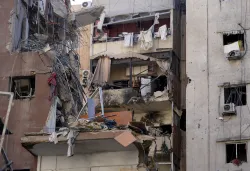Body of Hezbollah military commander Fuad Shukr found in Beirut rubble: Report
Late on Tuesday, Israel's military reported the killing of Shukr, identified as Hezbollah's highest-ranking commander, attributing responsibility to him for a weekend attack in the Israeli-occupied Golan Heights that resulted in the deaths of twelve youths.

The body of Hezbollah military commander Fuad Shukr has been found in rubble in the southern suburbs of the Lebanese capital Beirut, two security sources told Reuters on Wednesday. Israel's military announced late on Tuesday that it had killed Shukr, whom it named as Hezbollah's most senior commander and whom it blamed for an attack at the weekend that left a dozen youngsters dead in the Israeli-occupied Golan Heights.
Five civilians killed
The Lebanese Health Ministry said at least five civilians — two children and three women — died in the strike in a busy neighbourhood where Hezbollah has political and security operations. Israel and Hezbollah have exchanged fire since October 8, a day after Hamas attacked southern Israel and sparked the Israel-Hamas war in Gaza. Though Hezbollah issued a rare denial of involvement in the rocket attack Saturday in the town of Majdal Shams, Israel holds the militant group responsible. "Hezbollah crossed a red line,” Israeli Defense Minister Yoav Gallant posted on the platform X shortly after Tuesday's strike.
The two sides have exchanged near-daily strikes for the past 10 months against the backdrop of the war in Gaza, but they have previously kept the conflict at a low level that was unlikely to escalate into full-on war.
Lebanon's public health ministry said Tuesday's strike in a southern suburb of Beirut wounded 74 people, some of them seriously. The wounded were taken to nearby hospitals. Bahman Hospital near the site of the blast called for blood donations.
Lebanon's state-run National News Agency reported that the strike was carried out with a drone that launched three rockets. “The Israeli enemy has committed a great stupid act in size, timing and circumstances by targeting an entirely civilian area,” Hezbollah official Ali Ammar told Al-Manar TV. "The Israeli enemy will pay a price for this sooner or later.” Lebanese caretaker Prime Minister Najib Mikati condemned the Israeli attack, saying it hit a few meters from one of the largest hospitals in the capital.
The office of Israeli Prime Minister Benjamin Netanyahu did not immediately release a statement, but minutes after the strike sent a photo of the prime minister with his national security adviser and other officials.
The airstrike on Beirut's southern suburb of Haret Hreik — a crowded urban neighborhood where Hezbollah has political and security operations but which is also full of small shops and apartment buildings — damaged several buildings.